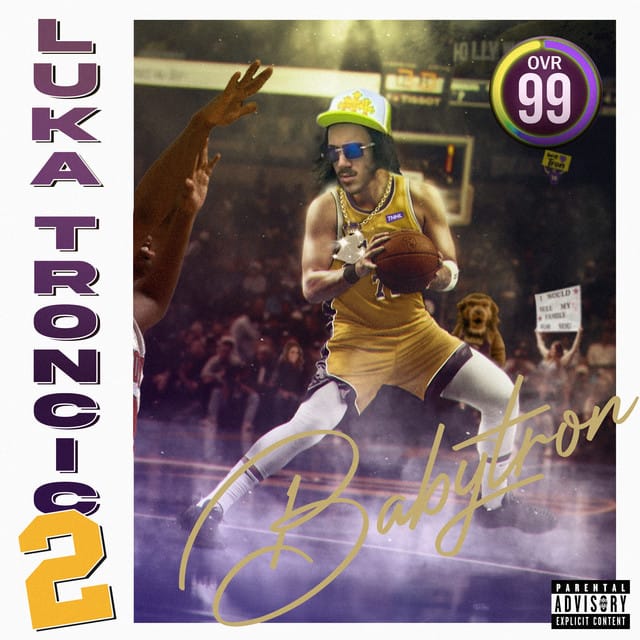Luka Troncic 2 (Album Review)
Luka Troncic 2 proves BabyTron still has bars—but it also makes it clear he’s stuck in the same formula. At 23 tracks long with little variation, the album feels more like a loop than a progression.

BabyTron is a Detroit-based rapper, known for his rapid flow, dense references, and Michigan-style production. He first started gaining traction in 2019 with the release of the BIN Reaper mixtape, which included his viral song “Jesus Shuttleworth.” Since then, he’s built a reputation for his high-volume output and consistent formula—short tracks, clever references, no hooks, and nonstop punchlines.
His discography includes projects like Megatron, Case Dismissed, Bin Reaper 3 (Old and New Testament), and Out on Bond, all released within a few years of each other. He also earned a spot on XXL’s 2022 Freshman Class and was featured on Eminem’s 2024 track “Tobey.”
He also has a handful of mixtapes he’s released over the years, most of which follow the same core approach: short, bar-heavy tracks delivered over Detroit and Flint-style beats, often with little variation in flow or structure. These tapes—while sometimes dropping under the radar—have helped solidify his cult following and reinforce the idea that BabyTron thrives on quantity and consistency more than reinvention.
Luka Troncic 2 is the latest addition to that run, and it sticks closely to the same blueprint he’s been using for years.
BabyTron has made a career out of doing one thing very well. For the past five years, he’s stuck to a formula: witty punchlines, layered references, and Detroit-style beats that slap hard even when they blur together. He’s consistent, no doubt. But at this point, it’s hard not to feel like he’s running in circles.
Luka Troncic 2 is not a bad album because it’s sloppy or undercooked. It’s a bad album because it’s safe. If you’ve heard any of his last few projects, you’ve basically heard this one too. And while he’s still got bars for days and an undeniable ear for beats, the lack of evolution is dragging him down.
I wanted to like this. I do like BabyTron. But when every track feels like a copy of the last, it becomes a chore to make it through the full 23-song tracklist. I know he’s capable of more. He just seems afraid to go there.
Sonically, Luka Troncic 2 is everything you’d expect from a BabyTron mixtape—Detroit bounce, fast-paced beats, chopped samples, and slick production that never sounds cheap. On a technical level, the production is solid across the board. The issue is that it all feels like déjà vu.
Every track follows the same pattern: cold beat, clever bar, same flow. Tron rarely switches cadence or experiments with delivery, and that makes the project feel way longer than it actually is. You could shuffle his discography from the past few years and struggle to tell which songs came from which album—or which year, honestly.
It’s not that the beats are bad. In fact, many of them are great. But when they’re all operating in the same sonic space with no shift in energy or tone, they lose their impact. Without dynamic pacing or stylistic contrast, Luka Troncic 2 becomes a flat line—technically clean but emotionally stale.
If there’s one thing BabyTron never slacks on, it’s his pen. His bars are consistently sharp, packed with references that range from deep sports trivia to viral internet culture. That kind of writing is part of what’s made him so fun to listen to over the years—he’s got an eye for detail and a delivery that rewards people paying attention.
But clever writing only gets you so far when everything around it stays the same. Across this album, Tron sticks to the exact same flow and song structure he’s been using for years. There’s rarely a hook, rarely a switch-up, and no real buildup or payoff. It’s just punchline after punchline over looped beats—fun in small doses, but exhausting stretched across 23 tracks.
You can’t deny his intelligence or his ability to come up with hard lines, but without variation, even the best writing starts to lose impact. At this point, it’s less about whether the bars are good (they are) and more about whether they’re doing anything new (they aren’t).
“Mukkbang” is one of the few songs on the album that feels worth replaying. The beat knocks, the bars hit, and while it’s still textbook Tron, it’s done well enough to stand out from the pile. It doesn’t reinvent anything, but it nails what it sets out to do.
“PunchGod 4” has the best beat on the album—hands down. It’s got that early trap energy, chopped R&B sample, and deep 808s that make the whole thing bounce. If Tron had used this track to push his flow or approach in any way, it could’ve been the standout moment of the whole album. Instead, he sticks to what he always does, but the production alone makes it a highlight.
“Final Level” is easily the strongest track on the project. Multiple beat switches, slight flow changes, and a sense of momentum make it feel like the only real moment of progression on the album. It’s longer, but it doesn’t drag—mostly because it actually moves.
The rest of the songs that came close—like “Michigander”, “Ex 2 (BM)”, “Caveman”, and “End-Zone”—have flashes of good ideas, but none of them do enough to feel essential. Whether it’s a solid feature (like Rio Da Yung OG or NoCap), a slightly better beat, or just a few fun bars, they flirt with standing out but ultimately fall back into the same pattern that makes the album feel so forgettable.
The biggest issue with Luka Troncic 2 isn’t that it’s bad—it’s that it’s the same. Every song follows the same formula: a quick intro, a looped beat, and bar after bar delivered in the same cadence Tron’s been using for years. The flows don’t change, the structure never shifts, and by track 8 you’ve already heard everything the album has to offer.
It’s not that the material is weak—Tron is still a sharp writer, and the beats are rarely bad. But across 23 songs, with almost zero stylistic variation, it becomes exhausting. There’s no dynamic pacing, no surprise moments, no emotional peaks or valleys. Just bars, beats, and repetition. If you played this album on shuffle with any of his last few projects, it’d be tough to tell what came from where.
By the end, it honestly felt like a chore to get through. And if I wasn’t reviewing it, I don’t know that I would’ve finished it at all.
What’s frustrating about this album isn’t that BabyTron has lost it—it’s that he’s clearly still capable, but refuses to try anything new. He’s locked into this one mode he knows works, and he’s been stuck there for years. At a certain point, consistency starts to feel like stagnation.
The production could easily support more experimentation. There are moments—like on “Final Level” or even “PunchGod 4”—where a slight change in delivery or structure would’ve made all the difference. But instead, Tron keeps going back to the same exact flow, the same energy, the same tricks. It’s hard not to feel like he’s clinging to a prime he doesn’t want to move past.
Nobody’s expecting him to drop some alt-R&B concept album, but even a shift in pacing, some hook variation, a narrative track—something—would show growth. He’s proven he can write. He’s proven he can rap. Now it’s time to prove he can evolve.
This album was hard to get through. Not because it’s technically bad, but because it’s the same thing BabyTron’s been doing for the last five years—with no sign of change. I still like Tron. I still think he’s one of the smartest and most unique writers in rap right now. But this project feels like it’s stuck in the past, trying to recreate a formula that’s already run its course.
There are a few songs I genuinely enjoy, but they’re surrounded by filler that blurs together. Nothing here feels essential. Nothing here pushes forward. For an artist with as much lyrical talent and potential as Tron, that’s disappointing.
Final Score: 4/10.
Do better, Tron—I know you can.
Tron’s got the talent—there’s no question about that. But at this point in his career, doing the same thing over and over isn’t going to cut it. He’s proven he can rap circles around most people. Now it’s time to see if he can grow. Whether that means switching up the production, experimenting with structure, or just stepping out of his comfort zone, something’s gotta give.
Where do you think BabyTron goes from here? Are you still locked in, or starting to feel the fatigue too? Drop your comments below or hit me on IG @deepcutdigest—I wanna know your thoughts.
